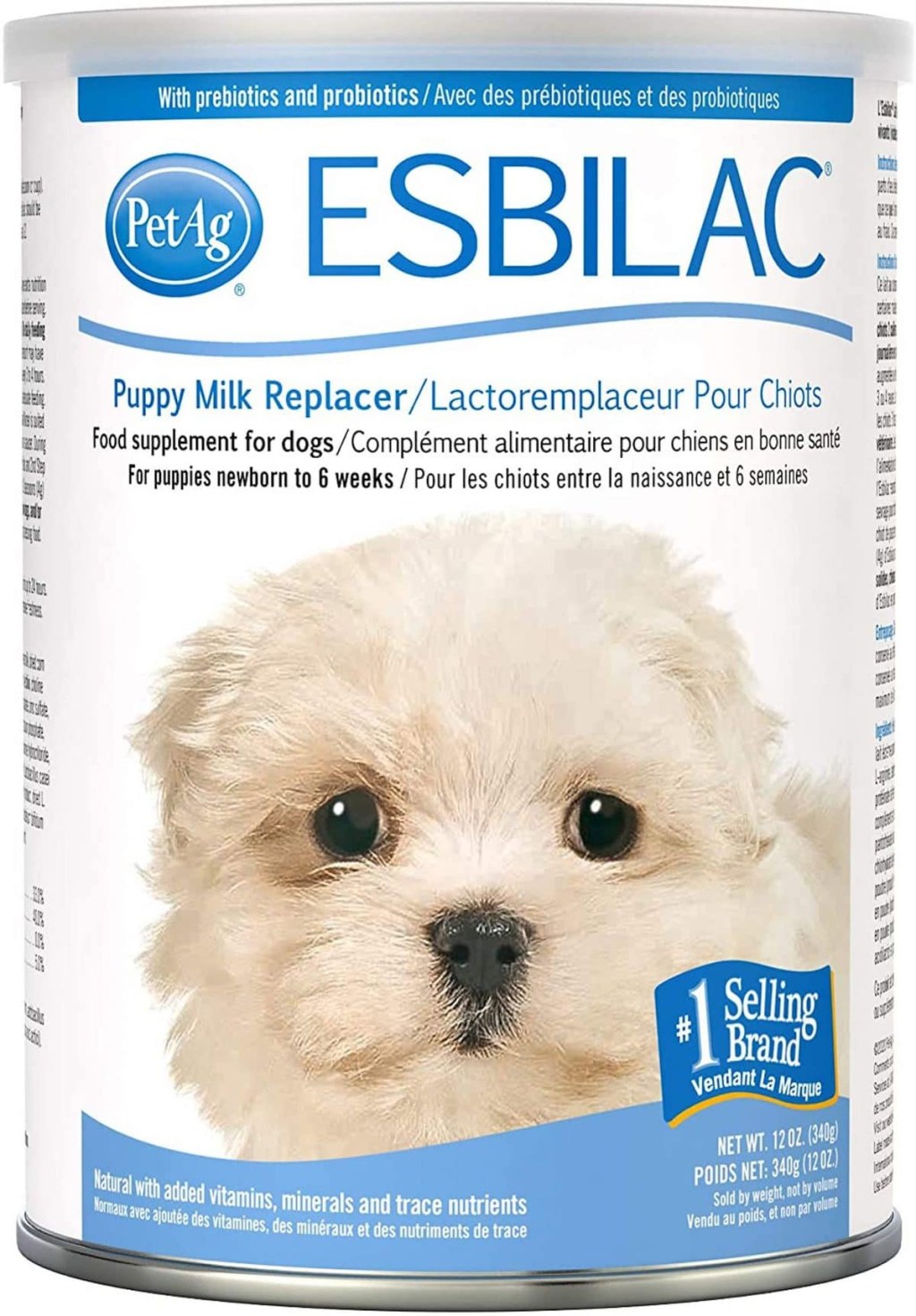Unlock The Secret: Discover The Perfect Amount Of Milk Replacer For Puppies
How Much Milk Replacer for Puppies: A Complete Guide
Welcome, Puppies Lover, to our comprehensive guide on how much milk replacer to feed your adorable furry friends. As a responsible dog owner, it is essential to provide the right nutrition for your puppies, especially during their early stages of development. In this article, we will discuss everything you need to know about how much milk replacer to give to your puppies, ensuring their health and well-being.
Introduction
1. What is Milk Replacer for Puppies?
1 Picture Gallery: Unlock The Secret: Discover The Perfect Amount Of Milk Replacer For Puppies

2. Who Needs Milk Replacer for Puppies?

Image Source: k9ofmine.com
3. When Should You Use Milk Replacer for Puppies?
4. Where Can You Find Milk Replacer for Puppies?
5. Why Should You Consider Using Milk Replacer for Puppies?
6. How to Properly Prepare Milk Replacer for Puppies?
What is Milk Replacer for Puppies?
Milk replacer for puppies is a specially formulated formula that mimics the nutritional composition of a mother dog’s milk. It provides all the necessary nutrients, vitamins, and minerals needed for puppies’ growth and development. This substitute is often used when the mother dog is unable to nurse her puppies or if the litter is orphaned.
It is crucial to choose a high-quality milk replacer that meets the specific nutritional requirements of puppies. Look for reputable brands that offer balanced formulas to ensure optimal health and development.
Who Needs Milk Replacer for Puppies?
Milk replacer is primarily needed for puppies who are not receiving enough milk from their mother or are completely orphaned. In some cases, the mother dog may not produce enough milk due to health issues or a large litter. Alternatively, if the puppies are separated from their mother at an early age, they will require milk replacer to meet their nutritional needs.
It is important to note that not all puppies require milk replacer. If the puppies are nursing well and gaining weight, there is no need to supplement their nutrition. However, if you notice any signs of malnourishment or if the mother dog is unable to feed them adequately, it is recommended to consult a veterinarian and introduce milk replacer into their diet.
When Should You Use Milk Replacer for Puppies?
Milk replacer should be used when the puppies are unable to nurse from their mother or if they are orphaned. The ideal time to introduce milk replacer is during the first few weeks of their life when they are entirely dependent on their mother’s milk. However, consult a veterinarian before making any changes to the puppies’ diet.
If the mother dog is present but not producing enough milk, you can start supplementing with milk replacer once you notice signs of malnourishment in the puppies. These signs may include slow weight gain, constant crying, and lethargy. Always monitor the puppies’ progress and consult a professional for guidance.
Where Can You Find Milk Replacer for Puppies?
Milk replacer for puppies is readily available in pet supply stores, veterinary clinics, and online platforms. Look for reputable brands that offer specific formulas for puppies. It is essential to choose a milk replacer that closely resembles a mother dog’s milk to provide the necessary nutrients for proper growth and development.
When purchasing milk replacer, check the ingredients, nutritional information, and follow the recommended guidelines for preparing and feeding. It is always best to consult a veterinarian for personalized advice on choosing the right milk replacer for your puppies.
Why Should You Consider Using Milk Replacer for Puppies?
Milk replacer provides essential nutrients for growing puppies, ensuring they receive proper nourishment, especially when the mother dog is unable to nurse them adequately. Here are some reasons to consider using milk replacer for puppies:
1. Nutritional Balance: Milk replacer is formulated to provide a well-balanced diet for puppies, consisting of proteins, fats, carbohydrates, vitamins, and minerals.
2. Growth and Development: The nutrients in milk replacer support the puppies’ overall growth and development, including bone and muscle formation.
3. Convenience: Milk replacer allows you to ensure the puppies receive proper nutrition even if the mother dog is unavailable or unable to nurse.
4. Orphaned Puppies: In cases where the puppies are orphaned, milk replacer is vital for their survival and healthy development.
5. Supplemental Nutrition: Even if the puppies are nursing from their mother, milk replacer can be used to supplement their diet and provide additional nutrients.
How to Properly Prepare Milk Replacer for Puppies?
Preparing milk replacer for puppies requires following the instructions provided by the manufacturer. Here are the general steps to properly prepare milk replacer:
1. Measure: Use the provided measuring scoop to measure the appropriate amount of milk replacer powder according to the puppies’ weight and age.
2. Mix: Add warm water to the milk replacer powder and mix thoroughly until the powder is completely dissolved.
3. Temperature: Test the temperature of the milk replacer by applying a few drops to your inner wrist. It should be lukewarm, similar to the mother dog’s milk.
4. Feeding: Use a suitable feeding bottle or syringe to feed the puppies. Ensure they are in a comfortable position and allow them to suckle at their own pace.
5. Frequency: Puppies need to be fed regularly, approximately every 2-4 hours, depending on their age and size. Consult a veterinarian for a feeding schedule tailored to your puppies’ needs.
6. Hygiene: Clean and sterilize all feeding equipment thoroughly before each use to prevent contamination and ensure the puppies’ health.
Advantages and Disadvantages of Using Milk Replacer for Puppies
Advantages
1. Ensures Proper Nutrition: Milk replacer provides the necessary nutrients for optimal growth and development of puppies.
2. Convenient Feeding: Using milk replacer allows you to feed puppies even when the mother dog is not available.
3. Essential for Orphaned Puppies: Milk replacer is crucial for the survival of orphaned puppies who do not have access to their mother’s milk.
4. Supplementation for Insufficient Milk Supply: If the mother dog is not producing enough milk, milk replacer can help supplement the puppies’ nutrition.
5. Controlled Nutrition: With milk replacer, you have control over the puppies’ nutrition, ensuring they receive the right balance of nutrients.
Disadvantages
1. Lack of Maternal Antibodies: Milk replacer does not provide the same level of maternal antibodies found in the mother dog’s milk, which help boost the puppies’ immune system.
2. Mother-Puppy Bonding: Feeding through milk replacer may affect the bonding between the mother dog and her puppies.
3. Preparation and Cleaning: Properly preparing milk replacer and cleaning feeding equipment can be time-consuming and require attention to hygiene.
4. Cost: The cost of high-quality milk replacer can be higher compared to other pet food options.
5. Potential Digestive Issues: Some puppies may experience digestive issues when transitioning from milk replacer to solid food. Gradual weaning is recommended to minimize these problems.
Frequently Asked Questions (FAQs)
1. Can I give regular cow’s milk to my puppies?
No, regular cow’s milk is not recommended for puppies as it does not provide the necessary nutrients and can cause digestive issues. Milk replacer specifically formulated for puppies is the best option.
2. How often should I feed my puppies with milk replacer?
The frequency of feeding depends on the puppies’ age and size. Generally, puppies need to be fed every 2-4 hours during their early stages. Consult a veterinarian for a personalized feeding schedule.
3. Can I mix milk replacer with solid food?
Once the puppies are ready for solid food, you can gradually introduce it alongside milk replacer. Gradual weaning helps them transition smoothly to a solid food diet.
4. How long should I continue feeding milk replacer to my puppies?
The duration of feeding milk replacer varies depending on the puppies’ growth and development. Consult a veterinarian to determine when to transition to a complete solid food diet.
5. Can I make homemade milk replacer for puppies?
It is generally not recommended to make homemade milk replacer for puppies, as it is challenging to achieve the appropriate nutritional balance. Commercially available milk replacers specifically formulated for puppies are the best choice.
Conclusion
In conclusion, providing the right amount of milk replacer to your puppies is crucial for their growth and development. It ensures they receive the necessary nutrients when the mother dog is unable to nurse them adequately. Remember to choose a high-quality milk replacer, follow the preparation guidelines, and consult a veterinarian for personalized advice. By taking the necessary steps, you can ensure the optimal health and well-being of your adorable furry friends.
Final Remarks
Puppies Lover, always prioritize the health and welfare of your puppies. While milk replacer can be beneficial in certain situations, it is essential to consult a veterinarian for professional advice tailored to your puppies’ specific needs. This article provides general information and guidelines, but individual circumstances may require different approaches. Always seek professional guidance to ensure the best care for your puppies.
This post topic: Puppies



